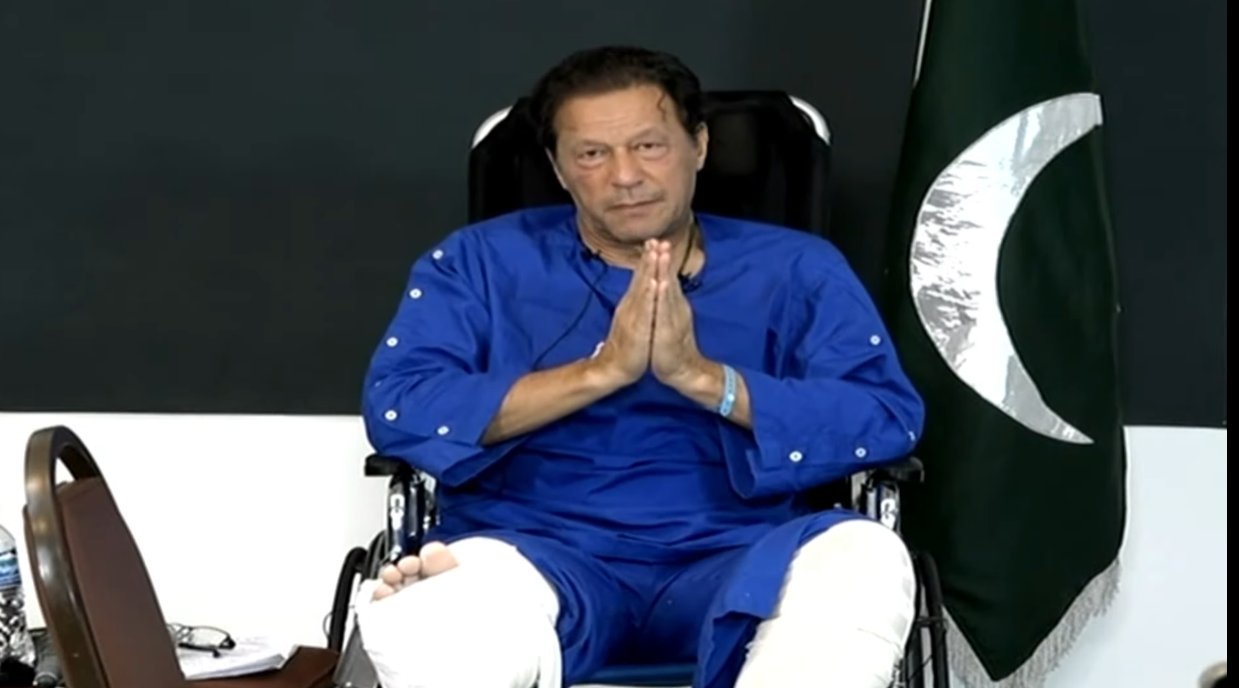

Pakistan Tehreek-e-Insaf (PTI) chairman Imran Khan
The tussle between Pakistan military and an aspirational civilian elite for controlling the key levers of power in Islamabad has entered the next round, following the failed attempt to assassinate former Prime Minister Imran Khan on Thursday.
By late Friday, when the contestants are usually charged with religious fervour, the Army has responded to Khan’s damaging allegation that the plot to assassinate him at Wazirabad when he was undertaking his Long March towards Islamabad on Thursday, included Major General Faisal Naseer. The naming as con-conspirator of Naseer, one of their own seems to have inflamed the military, which had already been stunned when angry protesters on Thursday night had virtually encircled the residence of Lt. General Sardar Hassan Azhar Hayat, the commander of XI corps in Peshawar, as the news of the attack on Khan spread.
The military saw the siege as a challenge to its legitimacy. Besides, in the end, it was a serious attack on the hybrid model of national leadership where the civilian government has played the role of a junior partner. Imran Khan was trying to reverse the equation—military subordination to an elected civilian government. Khan is not the first one to attempt to do so. The late Zulfikar Ali Bhutto went to the gallows when he tried to assert civilian control over the military. Former Prime Minister, Nawaz Sharif had tried to accomplish the same in October 1999 when he fired then Army Chief Pervez Musharraf. Within hours of the move, Musharraf was back in the saddle as the military had mounted a coup that removed Sharif from power.
On Friday night, the military media mouthpiece ISPR went ballistic and accused Khan of mounting “baseless and irresponsible allegations” against a senior army officer that are “absolutely unacceptable and uncalled for”.
Khan, during an address while sitting on a wheel chair in blue hospital clothes at Lahore’s Shaukat Khanum hospital where he is undergoing treatment had implored Pakistan Army Chief, Qamar Javed Bajwa of getting rid of “black sheep” in his force—an obvious reference to Maj. Gen. Naseer.
“If you don’t take action against black sheep. the nation […] will start breaking apart,” he said. Khan made it known that the military needs to play the backup role of supporting the civilian government and not the other way.
“If the military could unite the country, then East Pakistan (now Bangladesh) would not have broken away. Only political parties unite countries, the military helps.”
But declaring that it rejected Khan’s exhortation of weeding out Naseer**, the military statement categorically said that the “ the honour, safety and prestige of its rank and file is being tarnished by vested interests through frivolous allegations, the institution will jealousy (sic) safeguard its officers and soldiers no matter what”.
“The baseless allegations hurled at the institution/officials today are highly regrettable and strongly condemned,” it said. “No one will be allowed to defame the institution or its soldiers with impunity,” it said.
Another round of Pakistan’s power struggle is now set to begin on the streets after Asad Umar, leader of Khan’s Pakistan Tehreek-e-Insaf announced that there will be protests in “all cities” at 5pm on Saturday. “The site for each protest will be announced by the local teams,” he said.
“Show them that no one can suppress a truly free nation. I will participate in the protest at Liberty Chowk, Lahore,” he said.
From his hospital bed, Khan said that he would be back on the streets as soon as he was discharged from hospital.
In the interim, his supporters must continue protesting against the incumbent rulers who were supported by some military officials.
Also Read: Will Imran Khan’s assassination bid change Pakistan permanently?
Union Minister of State for External Affairs and Textiles, Pabitra Margherita, visited Eswatini, where he…
India and Fiji held their first Joint Working Group (JWG) meeting on defence cooperation in…
External Affairs Minister S Jaishankar on Thursday met a delegation of special envoys from the…
Amnesty International has issued a report demanding the immediate and unconditional release of detained leaders…
India on Thursday dispatched a consignment of 300,000 doses of Measles and Rubella vaccines, along…
At least four people were killed and dozens injured in violent clashes between law enforcement…